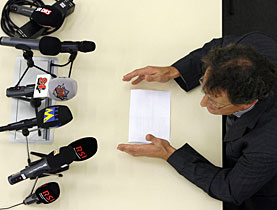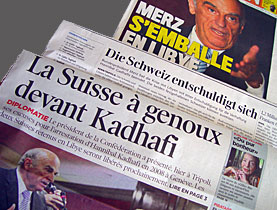Visa crackdown urged in Libya spat

A parliamentary commission has called for a tougher stance against Libya by imposing visa restrictions, but stopped short of advising a complete break in relations.
The recommendation by the foreign affairs committee of the House of Representatives was made in response to on-going problematic relations between the two countries – under strain since the arrest of a son of Libyan leader Moammar Gaddafi in Geneva last year.
The commission voiced support for current cabinet measures, but adopted by 12 votes to 11 a motion to restrict visas issued to Libyans travelling to Switzerland. A proposal to break off diplomatic relations with Libya was rejected by 14 votes to seven.
It also filed a complaint over the leak of a confidential government document to the Sonntag newspaper into the affair.
The document alleges President Hans-Rudolf Merz did not fully inform the cabinet about his planned visit to Tripoli to address the spat and that former Interior Minister Pascal Couchepin had written to Libya to apologise for the arrest.
“This [leak] was unacceptable,” said commission president Geri Müller, adding that it painted only part of the picture.
The moves come two weeks after a 60-day deadline for normalising relations between Switzerland and Libya ran out with no word on the fate of the two Swiss businessmen detained in Libya for more than a year. Their exit visas were revoked as part of a number of retaliatory measures against Switzerland following the arrest of Hannibal Gaddafi.
Foreign Minister Micheline Calmy-Rey has accused Libya of “kidnapping” them and “flagrant violation” of international conventions. Libya rejects the abduction charge.
Irritation
In its latest communication on relations, the Swiss cabinet expressed irritation over the “systematic refusal” of Libya to implement agreements between the two countries. But despite talking tough, there was no mention of sanctions or details of Switzerland’s future strategy.
Changes may be afoot however. For more than a year Switzerland has been isolated internationally over the diplomatic fall-out. But during the past few weeks, two nations have spoken publicly about the dispute.
The United States ambassador to Bern, Donald Beyer, said the US was “concerned” over the two missing Swiss businessmen and “would welcome their return”. Spanish Foreign Minister Miguel Ángel Moratinos also indicated that Spain might be willing to mediate between the two countries.
Freed brother
The agreement signed in Tripoli in August by Merz and the Libyan prime minister included a stipulation that an independent tribunal would be set up to look into the circumstances surrounding the detention of Gaddafi and his wife.
The couple was arrested at a Geneva hotel in July 2008 over reports that they mistreated two servants. Charges of causing physical injury were later dropped after a settlement was reached.
One of the servant’s brothers was reported missing soon after Gaddafi’s arrest and his case was brought to the Human Rights Commission of the United Nations. In a related development on Monday, a Geneva lawyer announced that the brother had been freed.
His family had confirmed his release on October 24, François Membrez told the Associated Press.
“His freedom was obtained as a result of repeated requests by the United Nations. He has returned to live in Morocco,” Membrez said.
He added that the families of the two Swiss detainees could also launch the same procedure through the UN commission to obtain their freedom.
The moves were supported by Amnesty International. On Monday, the human rights group said it had sent a letter to the Libyan authorities demanding the release of the two men.
Short of that, Amnesty said Libya should make known where they are being held, and contact with their families and lawyers should be restored.
swissinfo.ch and agencies
July 15, 2008: Hannibal Gaddafi and his wife Aline are arrested at a Geneva hotel after reports that they have mistreated two servants. After two nights in detention, the couple are charged with inflicting physical injuries against the servants. The Gaddafis are released on bail and leave Switzerland.
July: Two Swiss nationals are arrested in Libya. Swiss businesses are forced to close their offices and the number of Swiss flights to Tripoli is cut. Bern sends a delegation to Libya.
January 2009: Talks are held in Davos with Seif al-Islam Gaddafi, one of the Libyan ruler’s sons. A diplomatic delegation travels to Tripoli.
April: Hannibal and his wife, along with the Libyan state, file a civil lawsuit against the Geneva authorities in a Geneva court.
May: Foreign Minister Micheline Calmy-Rey visits Libya, reporting “significant progress”.
June: Libya withdraws most of its assets from Swiss bank accounts.
August: Merz, who meets the Libyan prime minister but not Gaddafi, apologises in Tripoli for the arrest. Swiss appoint arbitrator for international tribunal.
September: Libya does not let the two Swiss nationals leave the country, breaking a promise made to Merz that they would be free to return to Switzerland before September 1. Libya names its representative for the tribunal. Gaddafi and Merz meet on the sidelines of the UN General Assembly in New York. The two nationals disappear after undergoing a medical check-up in Tripoli.
October: A Swiss delegation returns empty-handed from Tripoli. A 60-day limit for normalising relations between Switzerland and Libya passes with no sign of the two Swiss hostages held by Tripoli. The Swiss cabinet expresses irritation over Libya’s “systematic refusal” to implement agreements between the two countries.

In compliance with the JTI standards
More: SWI swissinfo.ch certified by the Journalism Trust Initiative












You can find an overview of ongoing debates with our journalists here . Please join us!
If you want to start a conversation about a topic raised in this article or want to report factual errors, email us at english@swissinfo.ch.